
Read our 2024 annual report

Knowledge Hub
In a quiet health centre in Niger, mother-of-three Aminata holds onto her youngest son Hassane, who is lethargic and severely malnourished.
Earlier that day, Aminata travelled a long distance to the Concern clinic located in Koufan – a remote region far from her home in Lacouroussou. While it is an arduous journey, it is one that Aminata is happy to take, as it is the only way to improve her young son’s health.
After numerous visits, Hassane is gradually improving. With his weight becoming much healthier, the spark has returned to his eyes and he is much livelier. Aminata says she would like all her children to be smart and go to the nearest school when they are old enough.
Hassane is part of the 15% of children in Niger who are acutely malnourished, according to a 2018 report.
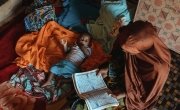
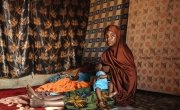
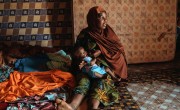
The need in Niger
For decades, it looked likely that the fight to end global hunger could be won. From 1991 to 2014, hunger levels had significantly decreased but, since then, it has slowly been on the rise again. Factors such as conflict and the growing climate crisis threaten to increase hunger even more and ruin years of progress, leaving millions of people at risk of starvation.
The need is especially great in Niger, which is ranked last out of 189 countries in the UNDP 2020 Human Development Index Report. Around 9.5 million people are affected by extreme poverty in the African nation.
This situation is aggravated by armed conflict at some of Niger's borders with neighbouring countries. Similarly, terrorist organisations within the country have caused significant internal and external security and stability challenges. Since conflict began in 2003, many families have been forced to flee their homes, with 223,094 leaving the country and 223,868 people displaced within Niger itself.
The country also faces recurrent cycles of food insecurity, malnutrition and natural disasters such as floods, droughts and locust infestations. For a country that is heavily reliant on agriculture, these challenges can have a devastating impact and result in high levels of hunger.
However, children like Hassane and mothers like Aminata will now be able to benefit from an innovative new nutrition programme, which aims to drastically improve the health of young children, as well as pregnant and lactating women, in five of the world’s poorest countries.
Enhanced Responses to Nutrition Emergencies (ERNE) is a three-year humanitarian programme that Concern is running in partnership with the European Union.
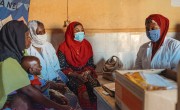
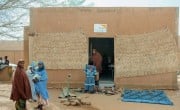
Dedication of our healthcare workers
Programmes like ERNE simply wouldn’t happen if it wasn’t for our extremely dedicated healthcare workers and volunteers. Despite the continuing COVID-19 pandemic, the ERNE programme has supported 202 health facilities and successfully treated a total of 145,778 people in its first five months.
Mother-of-three Moussa Zouéra is Head Nurse at one of these health centres, and explains that she sees three children with moderate to severe nutrition every day. Despite facing these difficult conditions, Moussa loves her job and relishes every chance to help her community.
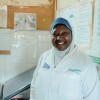
If you see a very sick child and there is no money for medicine for his child, it is sad. But if they come to us, we help them. It’s a joy for us to help sick children. Those are our children, our brothers, my sisters.
Moussa added that the wide-ranging supports of the ERNE programme allows the healthcare workers to make a real impact in the local area.
“Concern’s presence in this area makes it easier to take care of the community. The team provides us with support, training, food, medicine and many things we need in the area,” she said.
“There are other supports too, such as handwashing kits, soap, training and medical screenings at the neighbourhood level.”

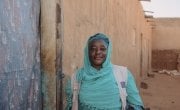
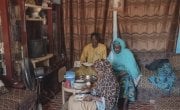
Community Awareness Officer Ramatou Jean Coffi, who has worked for Concern for eight years, has had her fair share of heartache. She lives with her husband, daughter and her brother's two children, who she took in after his death. Tragically, Ramatou also lost her young son in 2018 in a drowning accident while he was playing with his friends.
“This situation has shaken me a lot. These emotions have affected me a lot. I've have even gotten sick; I was so heartbroken."
Despite facing her own personal challenges, Ramatou has remained committed to her work helping the most vulnerable in her community.
ERNE in action
Innovation is at the heart of the ERNE programme and Concern’s pioneering CMAM approach, which focuses on home-based nutrition support, rather than health centre-based, will be utilised.
CMAM Surge is a health-system strengthening approach that helps prepare health facilities to respond to increased demands in acute malnutrition treatment services. These often occur due to seasonal impacts or unforeseen shocks and stresses and CMAM Surge has been set up in all project areas to help to deal with this.
Malaria, acute respiratory infections and diarrhoea will also be targeted in our response, as they have the highest prevalence in our region of intervention.
As with most of Concern’s programming, collaboration with local governments and partner organisations is essential to ensure the most vulnerable communities and households are targeted for assistance.
When a child is receiving treatment for malnutrition, signs of a healthy recovery can usually be seen within 72 hours. Once they leave, Concern continues to check in every week.
Back in the Koufan Integrated Health Centre, Hassane is weighed and measured, as he is every two weeks, and a record is kept. The team performed a full health screening on him and, from that, they provide therapeutic supplement for Hassane, to give him the vital nutrients he needed to get better.
Not only that, they support his family with nutritional and hygiene training, which is vital to keep Aminata’s family healthy.
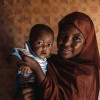
I was taught about the importance of washing my hands in different situations. We have training on how to give the children the food supplements and hygiene practices we didn't know before.
This constant care and supervision is also a big relief to people like 20-year-old mother of twins Sauweka.
When her twin boys were born, they were extremely underweight and needed urgent care. Sauweka and her family didn't think they were going to live. But, despite the odds, the health centre staff gave her sons the medical help and care that they needed to survive.
Without the dedication and perseverance of people like Moussa and Ramatou, our nutrition scheme would not be possible.
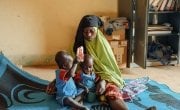

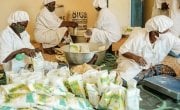
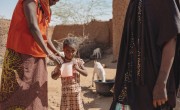
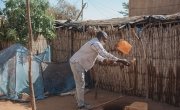
What’s next?
Over the three years of the ERNE programme, Concern aims to reach almost 300,000 people, with the supports currently being rolled out in the Democratic Republic of Congo, Niger, Ethiopia, South Sudan and Sudan.
While the global COVID-19 pandemic has significantly impacted operations, the ERNE programme is well-placed to support a response to the pandemic, by strengthening hygiene promotion and increasing food security. The CMAM approach will be especially useful in this context.
The increasing urgency of the climate crisis will also be factored into Concern’s programming.
Since climate change and gender inequality are key drivers of hunger and malnutrition, Concern Worldwide will work with our global partners Sonke Gender Justice and the Red Cross Climate Centre as part of a holistic approach.
Sonke Gender Justice will promote gender inclusive and transformative work, which will put women at the heart of this response, both at home and in the workplace. Red Cross Climate Centre will study historical climate information in ERNE countries, mapping this against climate predictive models, analysing patterns and identifying key climatic drivers of food crises.
By taking actions like this, the programme will not only help in meeting immediate needs, but also build resilience to shocks and stresses through early warning and early action systems. This means that families like Hassane’s and Sauweka’s can look forward to a brighter future.
Keep updated
To see more photography of our programme work in action in 23 of our poorest countries around the world, follow us on Instagram.
Our partners
Other ways to help
Corporate support
Is your company interested in working together for a common cause?
Fundraise for Concern
From mountain trekking to marathon running, cake sales to table quizzes, there are lots of ways you can support our work.
Buy a gift
With an extensive range of alternative gifts, we have something to suit everybody.
Leave a gift in your will
Leave the world a better place with a life-changing legacy.
Volunteer with Concern
The lots of ways to get involved with our work as a volunteer
School fundraising
Without the generous support from schools, we wouldn't be able to do the work that we do.


